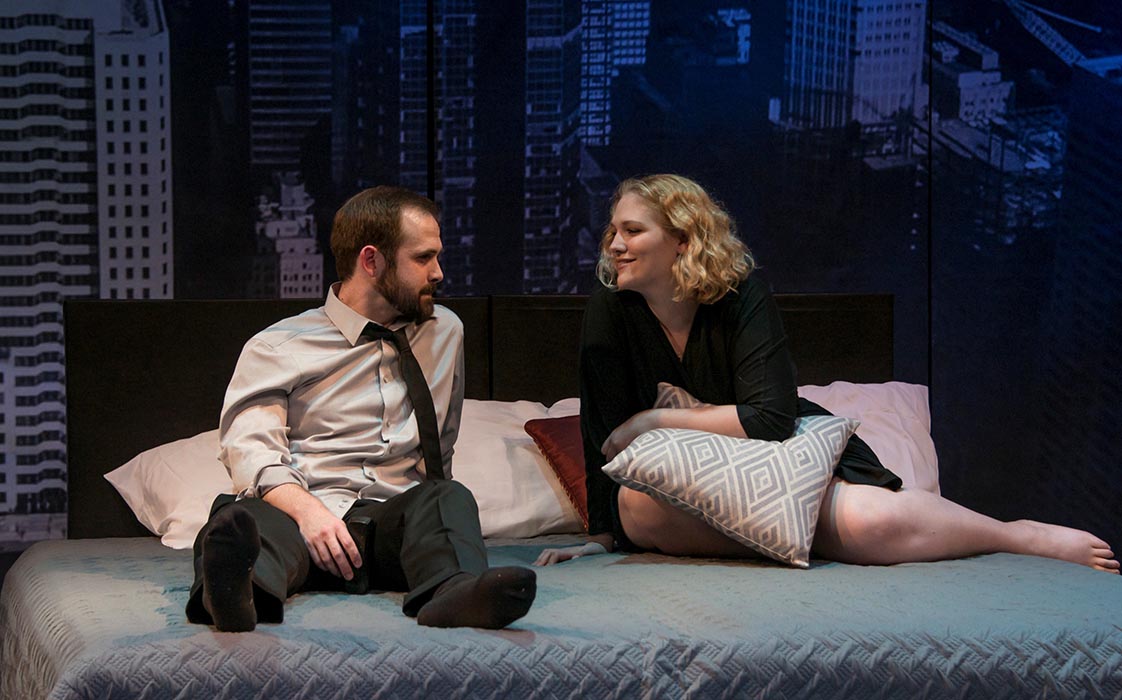A
good piece of theatre always keeps its audience guessing, a bit off balance as it were, exploring a narrative hallway of doors left there by the playwright. Becky Shaw, a 2008 comedy by Gina Gionfriddo that opened Thursday evening in the Lab Theatre of the Clarence Brown, has just that effect on its audience. Gionfriddo has built her tale around the personal relationship landscape of five characters—a tale that ebbs and flows in this superb production like a tidal pool of shifting perspectives on sex, friendship, life ethics, marriage, and emotional journeys.
Gionfriddo uses maybe two-thirds of Act I in setting up a fairly complex narrative with a carefully revealed exposition twisted around some razor-sharp banter that should intrigue any theatregoer. Director David Ratliff has given this setup plenty of breathing room, allowing the obvious—and not so obvious—character traits to percolate to the surface. We meet the 30-something Suzanna (Danielle Pressley), a psychology doctorate student, in an ongoing state of angst over her father’s recent death and her MS-afflicted mother’s own issues with money and health crises. Suzanna’s adopted brother, the acerbic Max (Mark Jennings), now a successful money manager, is part of this equation, dealing with the family finances and the quasi-siblings’ past and present romantic attraction.
This extended set-up builds a marvelous sense of anticipation for the entrance of the title character, Becky (Meg Sutherland). Max, a confirmed “short-timer” relationship-wise, has been set up on a date with Becky by Suzanna and her new husband, Andrew (Curtis Bower). A cleverly drawn character, Becky arrives at their apartment somewhat overdressed in a pink party dress. Equal parts nervous, self-conscious, down on her luck, and lacking confidence, Becky is obviously not the ideal date for the sharp-witted, cynical Max, a fact that he does not hesitate in making perfectly clear. And, not surprisingly, their date does not go as planned, we discover, ending in a robbery, the police, unfortunate sex, and rejection.

What’s marvelous about Sutherland’s subtle portrayal of Becky is that she is much more complicated than what she seems. Lured into feeling sympathy for sad-sack Becky, the audience is then fair game for Gionfriddo’s twists and Sutherland’s surprising disclosures, left to second guess that sympathy in face of Becky’s shards-of-broken-glass personality.
The audience must also investigate their shifting feelings for Suzanna and Max. Pressley paints the vacillating Suzanna with a fine articulate brush, ultimately being the real target for sympathy, oddly enough. One feels for the tentative relationship she has with her new husband. Yet their pairing, even explained as a quickie Las Vegas wedding, does seem a little contrived.
Gionfriddo has put a substantial amount of depth into Max’s distasteful personality flaws and demeanor, a depth that Jennings mines in deliciously agonizing detail. While one admires Max’s logic and business savvy, it’s simply impossible to like him. And, although you may want to sympathize, Jennings makes sure we know he has made his own bed out of his tortured past.

The playwright has given the character of Suzanna’s mother, Susan (Bonny Pendleton), the role of commentator on the ethics of marriage and relationships. In some other play, Susan may have been a deus ex machina, arriving to supply wisdom, nice dinners, and financial support. In this play, such intervention means little more than a yes or no—a bandaid, as it were—hardly the guidance that Max and Suzanna could use. Pendleton senses this and delivers her lines and pronouncements with a flowing grandeur and confidence that place her at the apex of the dramatic familial triangle.
Rebecca Johnson’s simple set of cityscape backings and furniture was the perfect environment for the relationship dramatics, an environment given a subtly soft ambiance by Collin Hall’s lighting. Kate Samayoa’s distinctive costume choices seemed to directly define each character’s appearance.
This Lovers and Madmen production of Becky Shaw continues at the CBT’s Lab Theatre through October 21. Tickets and Information







